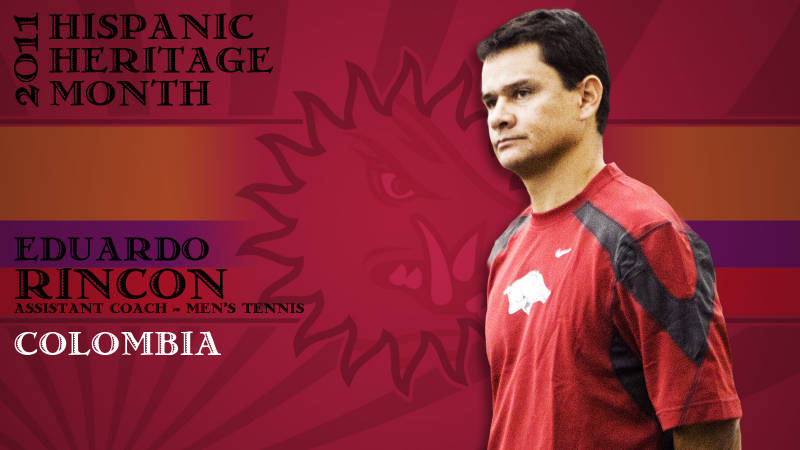FAYETTEVILLE - For the last 25 years, Arkansas men’s tennis has been under the guidance of head coach Robert Cox. A coach well-respected throughout the conference and the national college scene and a bearer of a bevy of experience. When searching for a new assistant coach three years ago, Cox looked for someone of the same experience and expertise to help him bring a winning attitude to an already proud tennis program. It wasn’t long before Eduardo Rincon was hired as the new assistant coach for Razorback men’s tennis.
Rincon, a native of Bogota, Colombia, is entering his fourth season as the second-in-command for men’s tennis and has brought a love and passion for the sport that is sometimes hard to duplicate. In Colombia, tennis is the third most popular sport behind soccer and cycling and that popularity is equivalent to basketball and baseball in the United States. Even the University of Arkansas has had one Colombian tennis player, Augusto Solano.
“I grew up watching my brother play tennis, Rincon said. “That’s how it all got started for me and I really had no choice. As far back as I can remember, I had a racket in my hands. The thing about Columbia is that tennis is on television a lot, outside of soccer. The tradition is there and you see that when our country plays in the Davis Cup.”
Upon finishing his schooling in Colombia, Rincon wanted to try his hand at the pro level instead of college. He played in the Davis Cup from 1997-2001 for his native country and competed against players such as former world No. 1 Marcelo Rios and Guillermo Canas, who had been ranked as high as No. 8 in his career. During that same span, he played on the satellite and challenger levels in over 30 countries. Rincon has also held ATP rankings in both singles and doubles. As much as he enjoyed playing pro tennis, Rincon has always believed that college is the best option for tennis when coming out of high school.
“It’s easy to get drained when trying to go pro too early,” Rincon said. “That’s what hurts a lot of the Latin players is that a lot of them try to go pro at an early age. They just try to go pro too fast and its better to take a few years and hone your skills because the average age of a pro tennis player is 26 years old.”
Rincon went on to say how thankful he was to be able to play college tennis at Valdosta State, a Division II school, even after logging so many years on the pro circuit.
“It was a blessing for me,” he said. “I wasn’t going to go to school and just be a student. It was something that changed my life. Thanks to that decision, I’m able to do what I’m doing now, which is what I want to do.”
“I remember having those conversations with my dad and my brothers. I was very defensive and when I go out and recruit, I can relate to those kids that are wanting to go pro. I try to show them the facts. Give them examples like John Isner, James Blake, guys that went to college and still succeeded on the pro level.”
Since arriving at Arkansas, Rincon has helped coach two All-Southeastern Conference selections in Blake Strode and Chris Nott, and one All-American (Strode). Strode earned All-SEC and All-America honors in 2009 and Nott was named All-SEC for two straight years (2010, 2011). During his All-America year, Strode advanced to the semifinals of the NCAA Individual Championship. He also finished that same year ranked No. 13 by ITA.
“The thing that brought me to Arkansas was that I was always told how much of a class act Coach (Robert) Cox was,” Rincon said. Everyone I worked with spoke highly of him and when I got the chance to move to Fayetteville, I didn’t even think about it. I knew I needed to be here.”
National Hispanic Heritage Month is celebrated in recognition of the historical and cultural contributions of Hispanic Americans whose ancestors came from Spain, Mexico, The Caribbean and Central and South America. This national observance was first established in 1968 when Congress authorized the president to proclaim National Hispanic Heritage Week each year. In 1988, Congress extended the observance from a week to a month. The annual observance is now a 31-day period beginning September 15 and ending October 15.
Topics
Contacts
Kevin Trainor, Associate AD for Public Relations
Athletics
479-575-6959,
